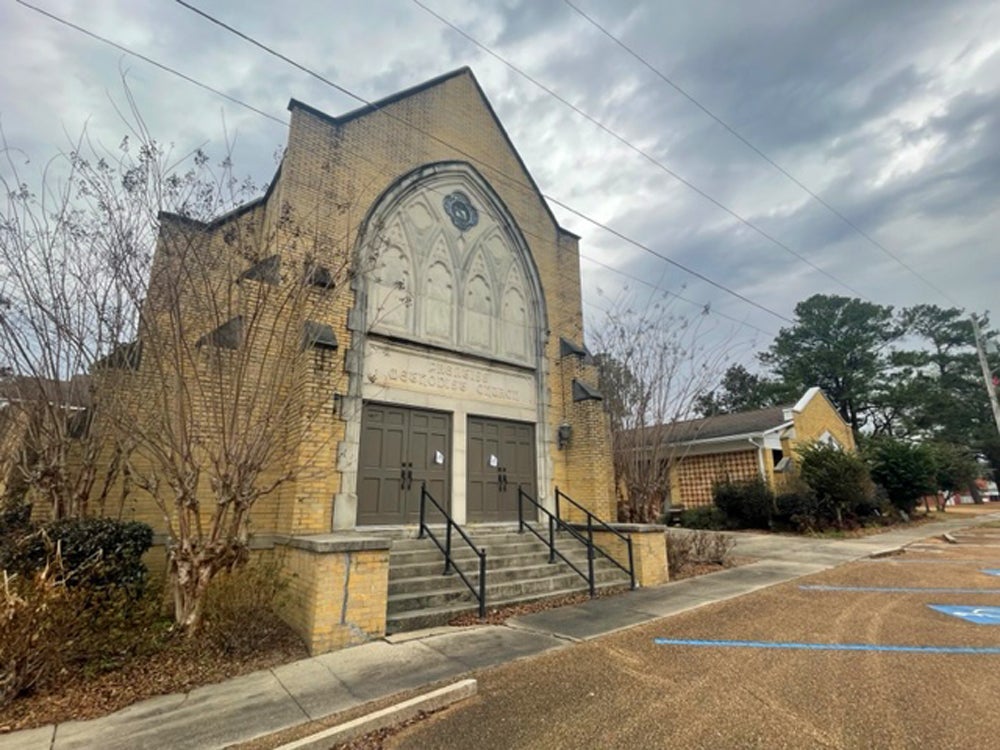JDC Methodist churches decide to disaffiliate from UMC
Published 8:58 am Thursday, January 26, 2023

- Holley Cochran / The Prentiss Headlight— Prentiss Methodist Church was founded in 1911 and became Prentiss United Methodist Church in 1968. The church has voted to disaffiliate from UMC.
United Methodist Church churches that have been a part of the same denomination for decades or centuries may soon have to redefine themselves.
The UMC churches in Jefferson Davis County have been exploring whether to disaffiliate from the denomination on the issue of the ordination of LGBTQ clergy and performing same-sex marriage.
Last month, members of Prentiss United Methodist Church took a straw vote to get a clear idea of which direction the church is leaning, to disaffiliate or not. Two-thirds of the professing members present at that meeting expressed that they want to disaffiliate, which is what is required for it to become official.
Prentiss Methodist Church was established in 1911. On April 23, 1968, The United Methodist Church was created when Bishop Reuben H. Mueller, representing The Evangelical United Brethren Church, and Bishop Lloyd C. Wicke of The Methodist Church joined hands at the constituting General Conference in Dallas, Texas.
With the words, “Lord of the Church, we are united in Thee, in Thy Church and now in The United Methodist Church,” the new denomination was given birth by two churches that had distinguished histories and influential ministries in various parts of the world.
Theological traditions steeped in the Protestant Reformation and Wesleyanism and relationships that dated back almost two hundred years facilitated the union.
Prentiss Methodist Church became Prentiss United Methodist Church as a result of this merger in 1968.
Santee United Methodist Church in Bassfield took a straw vote as well, and also voted to disaffiliate. Rev. Robb Webb is the current pastor for both congregations.
The district superintendent has been informed that both churches wish to take the next step in the disaffiliation process.
L.L. Roberts in Bassfield
Carson United Methodist Church is the county’s fourth UMC and is a non-practicing United Methodist Church due to lack of membership.
The votes remain unofficial until the superintendents representing each district set a date and time for an official vote. State conference of Mississippi should ratify the decisions in June of 2023.
This movement was prompted when in 2019, a special meeting was held of the UMC general conference The “Traditional Plan,” which affirms UMC’s stance that LGBTQ individuals in a homosexual relationship cannot be ordained and that clergy should not perform a same-sex marriage, received 438 yes votes (53 percent) and 384 no votes (47 percent).
The diversity in UMC churches on this topic was evident and therefore Paragraph 2553, which is a disaffiliation clause that allows churches to leave the UMC and retain their property, was added to the Book of Discipline. The clause was added “because of the current deep conflict within The United Methodist Church around issues of human sexuality,” it states. With these provisions, disaffiliating churches are allowed to keep property currently held in trust, but anything that has the UMC emblem, a cross and a flame, has to be returned to the UMC conference.
The church pays the bills and keeps up with the property, but it is actually held in trust for the United Methodist Church. Prior to this clause, if a church pulled out, they couldn’t take the property. That includes the building and assets
The cost of disaffiliation varies from state to state, but in Mississippi it is two years of apportionments.
Apportionments vary from church to church depending on its size. The church must also pay two years of pension responsibility that support current and retired pastors. This provision expires on Dec. 31, 2023, and the next general conference isn’t until 2024. However, in October 2022, the Mississippi Conference Board of Trustees added a clause to Paragraph 2553 giving churches until June 2025 to disaffiliate to allow a more informed decision be made after the general conference of 2024.
According to UMNews.org, the official source of comprehensive information and news about the United Methodist Church, 2,003 churches, or 6.6 percent, in the U.S. have cleared the necessary hurdles under church law to leave the denomination with property since 2019. Forty-three of these were United Methodist Churches in Mississippi.




